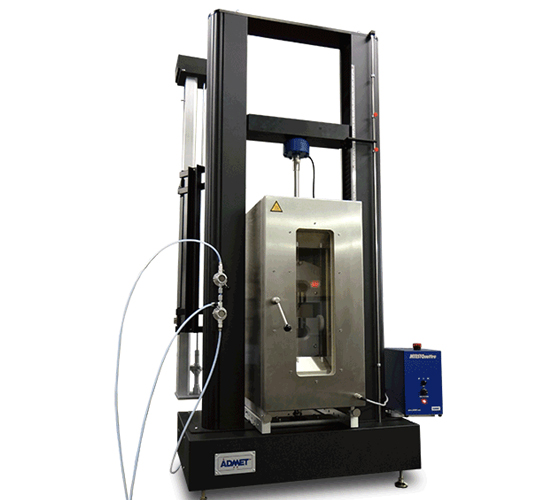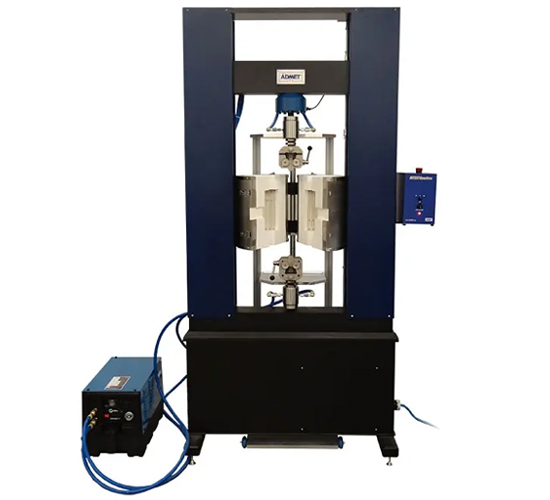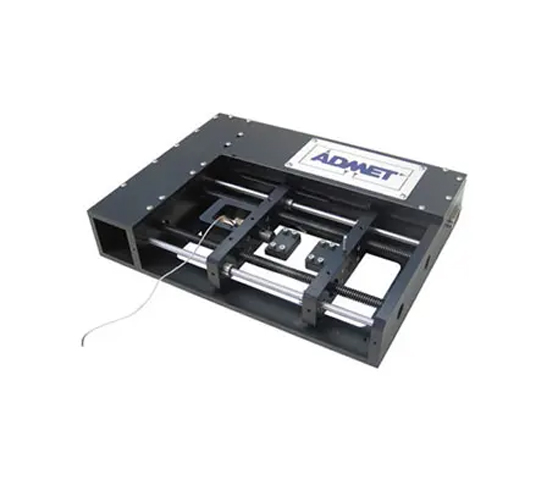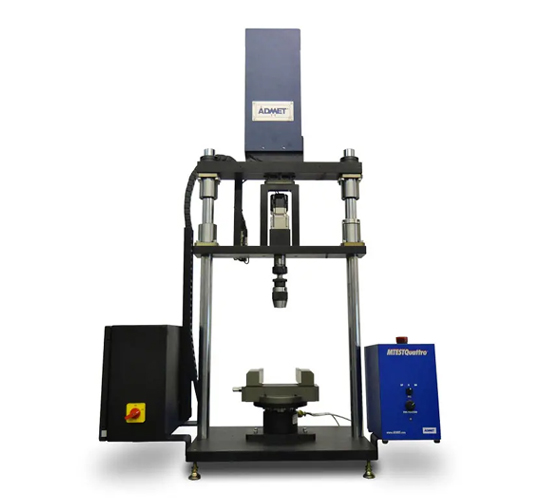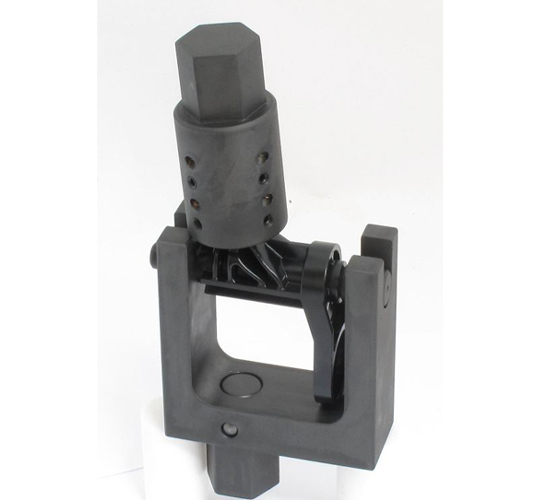
Torsion Grips: Universal Testing Machine Accessory for Torsion Testing
The Torsion Grips are designed for accurate and efficient torsion testing on round samples, offering high performance and durability. These grips are ideal for testing materials under torsional forces, making them suitable for a variety of applications in research and material testing.
universal testing machine accessories, universal testing machine price, accessories, torsion grips, material testing grips, torque testing.
Torsion Grips are essential accessories for universal testing machines designed to apply and measure torsional (twisting) forces on materials. These grips are particularly useful for testing materials that are subjected to rotational stresses, such as wires, cables, rods, and shafts, commonly used in industries like automotive, aerospace, electronics, and manufacturing.
The Torsion Grips are designed to securely hold specimens while applying a torsional load. They ensure precise measurement of the torque and angular displacement during testing, making them ideal for evaluating the twisting strength, rotational resistance, and elasticity of materials. These grips are critical in assessing materials for applications where they will be subjected to rotational forces in real-world conditions.
These grips feature a robust and user-friendly design, capable of handling a wide range of specimen sizes and materials. The adjustable clamping mechanism ensures a secure hold on various specimen diameters and geometries, whether the material is round, cylindrical, or rod-shaped. The grips also allow for easy specimen alignment to ensure that the forces are applied uniformly and accurately.
Constructed from high-strength materials such as steel and aluminum, Torsion Grips are built for durability and long-lasting performance. Their sturdy construction can withstand high torsional forces without compromising precision or reliability. These grips are designed to handle even the most demanding torsion testing environments, ensuring consistent and repeatable results.
Torsion Grips integrate seamlessly with most universal testing machines, offering a versatile and efficient solution for testing torsional properties. They are suitable for applications like torque measurement, twist-to-failure analysis, and fatigue testing, providing valuable insights into the material’s ability to withstand twisting forces.
For more information on Torsion Grips, customization options, and universal testing machine price, contact us today.
Torsion Grips Features
Torsion Grips offer a reliable and precise solution for torsion testing, enhancing the performance and versatility of universal testing machines in a variety of applications.
Torsion Grips Specifications:
Torsion Grips are designed for testing materials under torsional stress using Universal Testing Machines (UTMs). These grips are specifically engineered to secure specimens while they undergo rotational forces, allowing for the accurate measurement of a material’s torsional strength, twist resistance, and shear properties. Torsion testing is essential for evaluating materials used in industries where rotational forces are involved, such as aerospace, automotive, and manufacturing.
Torsion Testing of Metals and Alloys:
Torsion Grips are commonly used for torsion testing of metals and alloys, such as steel, aluminum, and copper, to evaluate their twisting strength, shear modulus, and fatigue resistance. This is important for materials used in structural components, shafts, and other parts subjected to rotational forces.
Rubber and Elastomer Testing:
These grips are ideal for testing rubber and elastomers under torsional stress to evaluate their torsional stiffness, deformation, and resilience. This is crucial for automotive and industrial applications where rubber components are exposed to twisting forces, such as in seals, gaskets, and suspension systems.
Composite Material Testing:
Torsion Grips are used for composite material testing, especially fiber-reinforced composites. The grips help evaluate the torsional strength of composites used in aerospace, automotive, and construction industries. These materials are often subjected to twisting forces, and torsion testing helps assess their durability and performance under stress.
Shaft and Gear Testing:
The grips are commonly applied in shaft testing, where metal shafts and gears are subjected to torsional loading to simulate real-world mechanical performance. This is crucial for components in machinery, engines, and turbines, where torsional forces are a key factor in overall performance and durability.
Torsion Testing of Wires and Cables:
Torsion Grips are used to test wires, cables, and conductors for their torsional strength and flexibility. This helps ensure that wires used in electrical systems, telecommunication cables, and aerospace wiring can withstand twisting without failure.
Plastic and Polymer Testing:
These grips are effective in testing plastics and polymers under torsional stress. They help evaluate how these materials respond to twisting forces and measure their torsional stiffness, resistance to breakage, and long-term performance under stress. This is important for plastic components used in consumer products, automotive parts, and medical devices.
Textile and Fiber Testing:
The grips can be used in textile and fiber testing to determine the torsional resistance of fabrics and yarns. This is relevant for testing synthetic fibers, textile ropes, and fiberglass used in various applications, including construction, marine, and sports industries.
Medical Device Testing:
Torsion Grips are applied in medical device testing, particularly for testing tubes, catheters, and other flexible medical components under torsional loading. Testing ensures that medical devices can handle the twisting forces they may encounter during use, such as in surgical tools or implantable devices.
Automotive Parts Testing:
These grips are essential for testing automotive parts such as drive shafts, torsion bars, and suspension components, which are regularly subjected to torsional forces. The grips help evaluate the strength, fatigue resistance, and performance of these parts in real-world conditions.
Energy Sector Applications:
Torsion Grips are used in the energy sector to test materials used in wind turbine blades, oil rigs, and nuclear reactors, where components are exposed to high rotational stress. Testing the torsional strength of materials ensures the longevity and reliability of critical infrastructure.
Torsion Grips are an essential tool for industries that require reliable and precise measurement of torsional strength and twist resistance. By providing consistent and accurate testing of materials under rotational stress, these grips help manufacturers ensure the performance and safety of products used in critical applications across aerospace, automotive, energy, medical, and other sectors.
Torsion Grips are specialized grips used in material testing machines to hold specimens during torsion tests. These grips are designed to securely clamp specimens while applying a twisting force, making them ideal for testing materials’ torsional strength, shear properties, and twisting resistance.
Torsion Grips function by securely holding the specimen at each end, allowing for the application of a torsional force or twisting moment. The grips rotate the specimen in a controlled manner while maintaining a firm hold, ensuring accurate results during torsion testing. This testing measures how well a material resists torsion and how it deforms under applied stress.
Torsion Grips are versatile and can be used with a variety of materials, including:
Textiles
These grips are suitable for materials that need to undergo torsional or shear stress testing, commonly used in industries such as automotive, aerospace, and manufacturing.
To install Torsion Grips:
Start the test, applying the twisting force and recording the results.
Key features of Torsion Grips include:
Easy installation on most universal testing machines.
Torsion Grips are generally designed for room-temperature testing. However, some models may be rated for moderate temperature testing. For high-temperature environments, it is important to confirm that the grips are suitable or use specialized grips designed for high-temperature torsion testing.
The maximum force that Torsion Grips can handle depends on the design and material of the grips, as well as the specimen type. These grips can withstand torsion forces typically ranging from a few newtons-meters (N·m) to several kilonewton-meters (kN·m), depending on the load capacity of the testing machine and the application.
Torsion Grips are used across various industries for testing materials’ torsional strength and shear properties, including:
Biomedical (for testing materials used in medical devices and implants)a
Advantages of Torsion Grips include:
Ease of installation and use on universal testing machines.
To maintain Torsion Grips:
Check for any misalignment to ensure that torsion forces are applied evenly during testing.
Yes, offers various models of Torsion Grips, each designed for different specimen sizes and applications, including:
Specialized grips designed for specific materials or testing environments.
Torsion Grips typically come with a one-year warranty against manufacturing defects. Extended warranties may be available depending on the model and customer needs.
